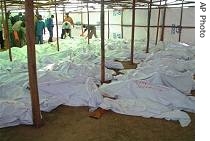2007年VOA标准英语-Rights Group Warns of More Violence in Rwanda(在线收听)
Nairobi
22 January 2007
An international human-rights watchdog is warning that Rwanda could erupt into a new cycle of violence if the authorities do not protect participants of the country's grassroots trials that hear and prosecute cases related to the 1994 genocide. Cathy Majtenyi reports for VOA from Nairobi.
In its report, Human Rights Watch says the murders last November of a genocide survivor and a judge in the grassroots gacaca court system sparked a series of revenge killings, leaving a total of 13 people dead.
The senior Africa advisor to Human Rights Watch, Alison Des Forges, tells VOA the authorities had not responded adequately to the killings. In the case of three deaths, she says, witnesses and evidence suggest that police may have extrajudicially executed the three victims.
"This pattern of failure to follow through has caused an increase in tensions, which is a very serious matter in a post-genocide situation," said Des Forges.
During Rwanda's 1994 genocide, Hutu extremists killed up to 800,000 Tutsis and
 |
| Covered bodies are laid out as Tutsi refugees from Congo, who survived a massacre by Hutu extremists at UN-run camp in Gatumba, Burundi, began the grim task (File photo - 15 Aug 2004) |
The masterminds of the genocide, high-ranking officials in the then-Hutu government, media, and military, are having their trials heard at the International Criminal Tribunal for Rwanda based in Tanzania.
Those who participated in the killings, lootings, and other crimes of the genocide are having their cases heard through the gacaca system, courts at the village level presided over by specially-trained community members chosen for their moral integrity.
The gacaca system, instituted in part to clear the enormous backlog in the Rwandan court system, has come under fire in the past from both Human Rights Watch and Amnesty International. The groups have said they fear the system may be subject to political pressures and may lack some basic internationally recognized safeguards.
Human Rights Watch's Des Forges tells VOA that both Hutu and Tutsi victims of the recent violence say that the authorities' protection is inadequate, ineffective, and biased against their ethnic group.
She says, if nothing is done, there could be a new cycle of violence in Rwanda.
"If there is no effective police action, obviously the fear and tension grows among survivor groups," added Des Forges. "There has been some talk of survivors forming self-defense groups to protect themselves, in which case you would see an increase in reprisal crimes against Hutus. The other consequence is a continuation or even an increase of killings of survivors, witnesses, and gacaca judges by those people who fear action by gacaca courts."
Attempts to reach relevant authorities in Rwanda were unsuccessful. Rwanda's permanent secretary in the Ministry of the Interior, Joseph Mutaboba, told VOA he was not familiar with Human Rights Watch's report, but that the authorities do provide adequate protection for those participating in the gacaca courts.